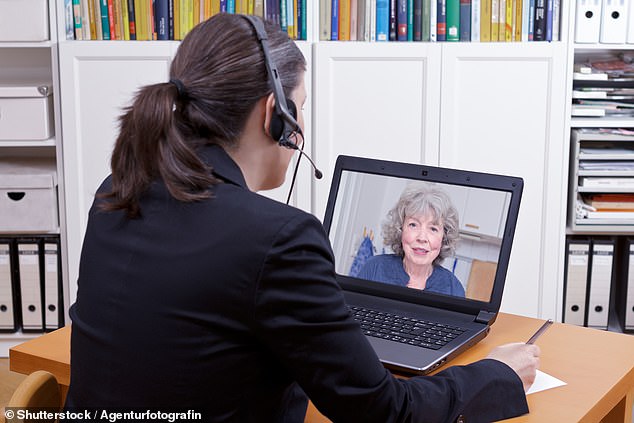‘It should be a last resort’: Experts voice concerns over temporary coronavirus laws allowing witnessing of wills on Zoom and FaceTime
- The Government plans to legalise the remote witnessing of wills
- The measure will be backdated to January, but is intended to be temporary
- But some lawyers fear people exerting pressure can stay out of camera shot
- ‘Wills can bring out the worst in people,’ warns one expert
A temporary law allowing wills to be witnessed over video has sparked warnings it could leave vulnerable people open to abuse and lead to more legal challenges.
The Government plans to legalise the remote witnessing of wills and backdate the measure to 31 January – the day the first coronavirus case was confirmed in the UK.
But while many lawyers welcome the move, some have also expressed concerns unscrupulous people will be able to exert pressure on those making wills, while remaining out of sight of witnesses over a video link.

Coronavirus measures: Many lawyers have dealt with vulnerable elderly clients via video during the pandemic
The measure will be kept in place until 31 January 2022, or longer if necessary due to the pandemic.
But after that the law will revert to requiring a person creating a will and two witnesses to be in the same place and all sign the document to ensure it is valid.
The coronavirus outbreak has led to a dramatic rise in people making wills and to calls for the law on witnesses to be relaxed.
Find a guide to making a will below.
The virus lockdown and social distancing created a huge practical challenge, especially as witnesses must not benefit from a will, which will often rule out people living in the same household.
The Ministry of Justice says the change allows people to have their wills legally recognised if they use technology like Zoom or FaceTime to get them witnessed, as long as the sound and video is good enough quality to see and hear what happens.
The backdated legislation will be passed next month, but the Government says using video technology should remain a last resort, and people must continue to arrange physical witnessing of wills if it is safe.
The Law Society of England and Wales says the decision to allow wills to be witnessed remotely will help alleviate difficulties during the pandemic, and it is glad guidance has been issued to minimise fraud and abuse.
The STEP trade body of inheritance professionals says wills can continue to be drawn up efficiently, effectively and safely by those isolating, and welcomed the move to apply this retrospectively.
Michael Culver, chair of the board at Solicitors for the Elderly, said he was glad witnessing via video conferencing was made an option in these highly unusual circumstances, but it should only be used as a last resort.
‘There are the obvious safeguarding issues that could cause problems, especially when it comes to looking out for undue influence and coercion.
‘For example, it will be harder to ensure the testator isn’t being coerced by someone else in the room, if you’re unable to see behind the camera. ‘
Other risks are issues over interpreting the law which could leave people without legally binding wills, and the documents getting lost in the post, adds Culver.
‘Also if your client is vulnerable and shielding they have to consider the logistics around actually posting the will.
‘This can cause delay and if they were to die before the final witness signs the will it will not be considered valid. All of this leaves the will open to disputes later down the line.’


Michael Culver: Only use video to witness wills as a last resort
Alistair Spencer, associate at Lime Solicitors, says during the lockdown lawyers have had to resort to increasingly inventive methods of complying with the existing Wills Act, which requires a will to be signed in the presence of two witnesses.
He says it is unlikely an Act dating back to the 1830s would cover witnessing of wills by video conferencing or allow for ‘virtual presence’, which could lead to more challenges to wills.
But although he welcomed the government moving the requirements into the 21st century, he voiced concerns the change has been rushed through without properly considering the impact on vulnerable individuals, and that this might also ultimately result in additional litigation.
‘It is simply impossible to know for certain if you are witnessing a will over video conferencing whether anyone is in the room with the testator when they are signing the will.
‘Individuals could easily avoid being seen by a video camera if they were intending to compel a testator to make a will in terms which favoured them.
‘The current witnessing requirements whilst not ideal do make it more difficult for an individual to be unduly influenced to make a will.’
Linda Ford, chief executive of the Chartered Institute of Legal Executives, says: ‘At a time of greatly increased demand, our members have told us clearly that social distancing and lockdown have caused significant difficulties with witnessing wills and so the government is right to make this temporary move.
‘Many consumers seeking access to services such as will writing are likely to be particularly vulnerable at this time, and measures to help further support social distancing at this time are greatly welcomed.
‘But these changes need to recognise the risks of duress, undue influence and fraud, and build safeguards into any such new regime.
‘Unfortunately, wills can bring out the worst in people and the retrospective nature of the change, whilst providing additional assurances for those who have already made their wills over the lockdown period, could make some cases particularly fraught.’
STEVE WEBB ANSWERS YOUR PENSION QUESTIONS

Ford urged the government to set up a promised industry working group to consider the security and technology involved in electronic signatures, and witnessing them by video.
Lorraine Robinson, head of legal at online wills specialist Farewill, said: ‘We’ve heard from hundreds of customers finding it difficult to get wills signed due to lockdown, isolation and illness.
‘This is a step in the direction of a more modern approach to witnessing wills – many of the laws are outdated and archaic.
‘Plus, if we do experience a second wave, this provides clarity and a real, safe alternative for a valid will to be made while in lockdown.
‘However, we’re urging people to be vigilant as the new law may not be as simple to follow in practice.
‘Wet signatures are still required and all parties must sign the same document together by video link.
‘This requires at least two separate video sessions, and for the passing of the original document between the parties, between video sessions.
‘It’s important to understand that this law does not enable electronic signatures of wills.
‘It’s quite unlikely that the law could be applied to urgent situations such as on a deathbed in hospital, particularly in isolation.’
She added that the allowing ‘counterpart’ documents to be signed and put together would have been a preferable option and more practical.
‘At Farewill we’re still advocating for a ‘dispensing power’ – something that already exists in Australia. It gives courts the ability to determine what constitutes a will, where somebody wanted to make one but wasn’t able to adhere to formalities.’
Charles Hutton, partner at Charles Russell Speechlys, said: ‘It is welcome news that the government has relaxed the rules about the witnessing of wills, bringing England in line with many other countries.
‘However, concerns remain that this process will be open to abuse. How are the witnesses to know that, just out of camera shot, there is not someone putting pressure on the testator to sign?
‘Admittedly, the current system is not perfect, but we may see a spike of undue influence cases following the deaths of those who have signed their wills in this way. The advice has to be to use the traditional method wherever possible.’


